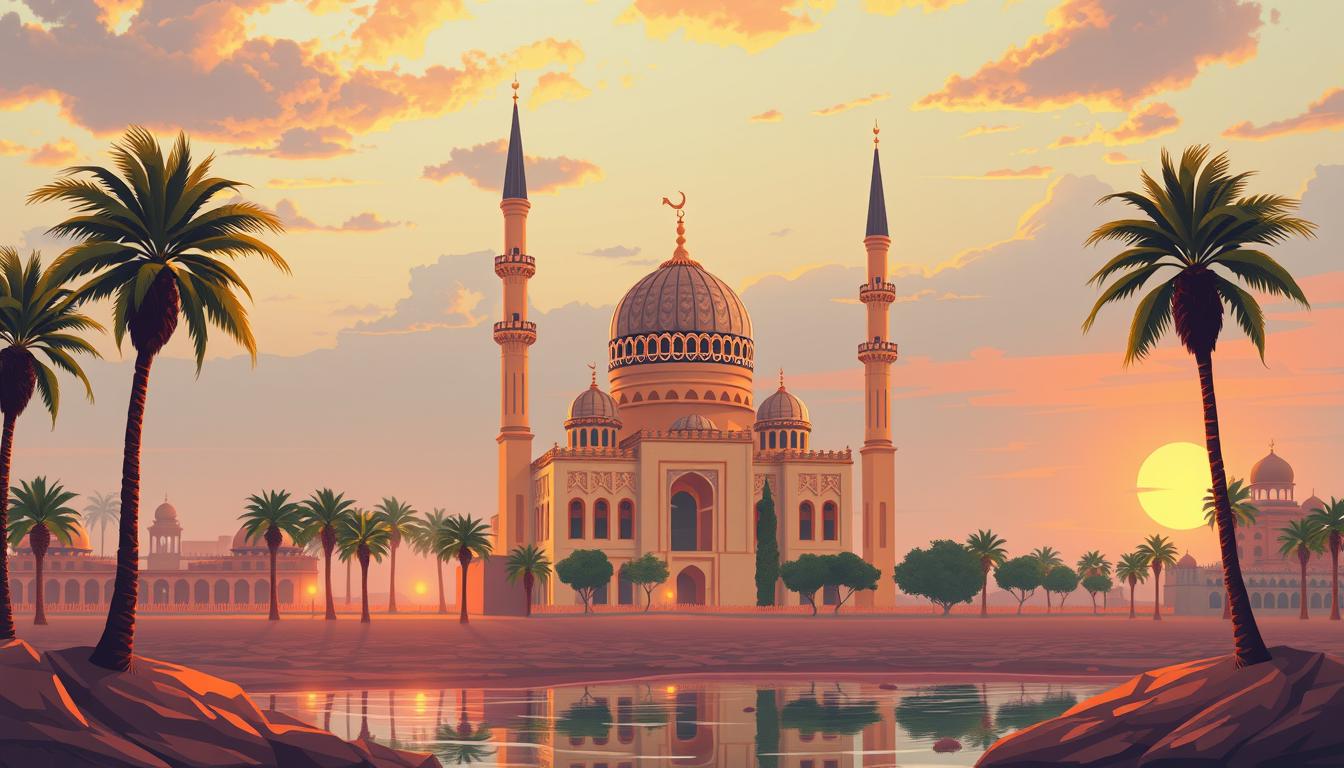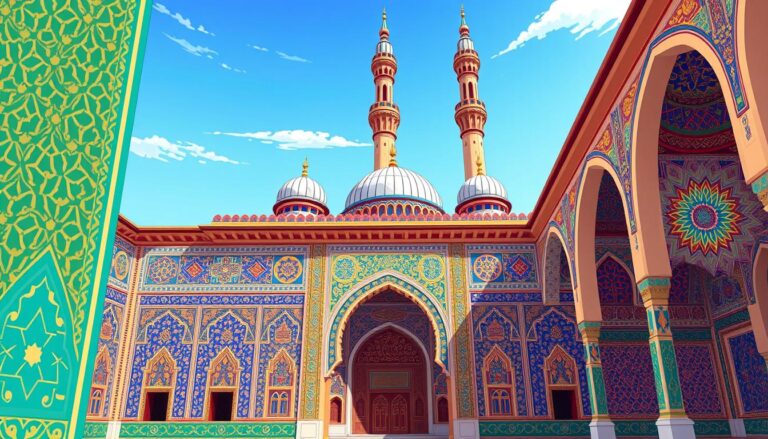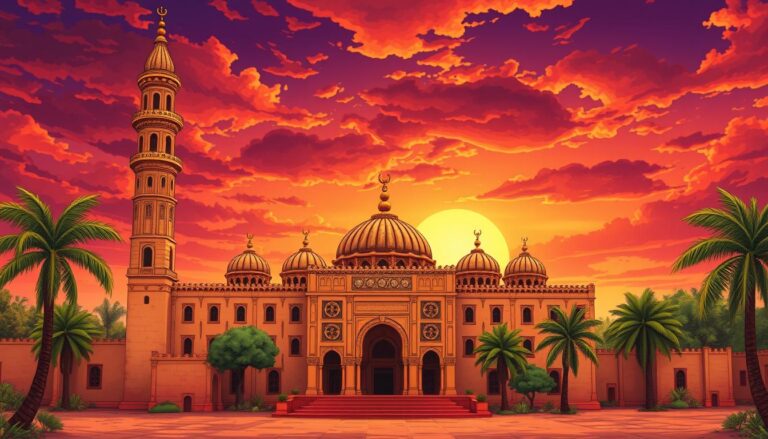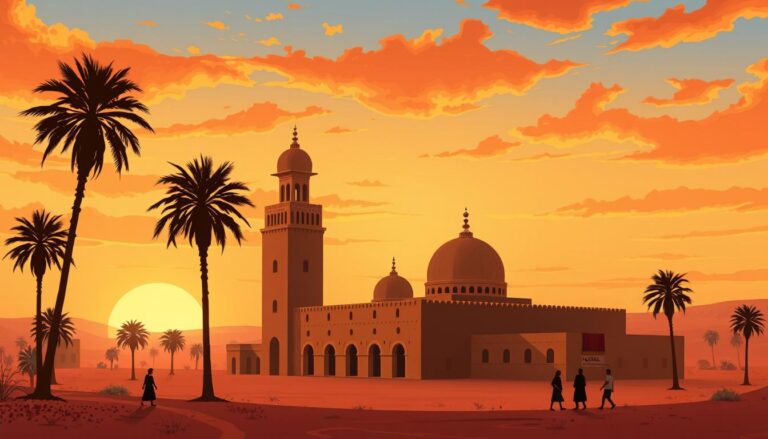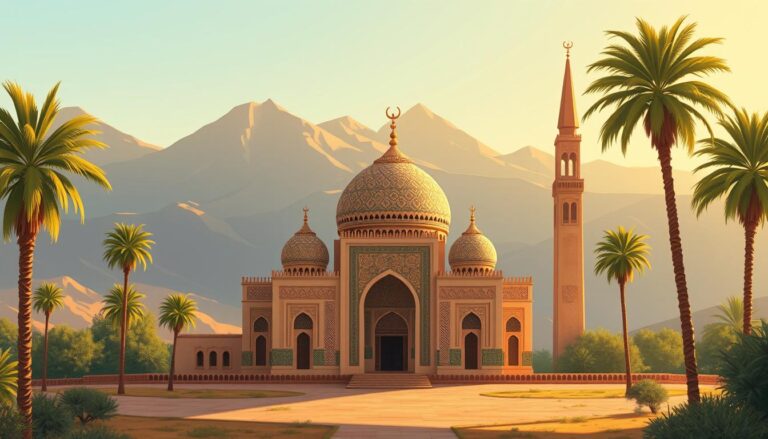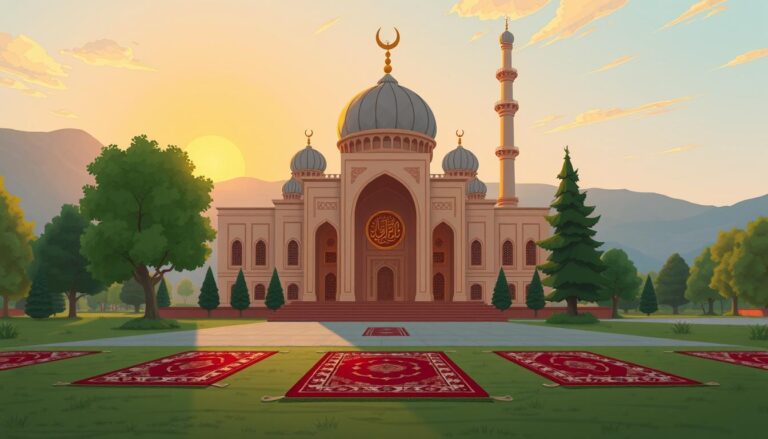Islam in Egypt
Islam is the main religion in Egypt, with about 90% of people calling themselves Muslims. Most Egyptians follow Sunni Islam, but some are Shia Muslims. Since 1980, Islam has been Egypt’s official religion.
There’s no recent census on religious beliefs, so we don’t know the exact number of Muslims. However, it’s believed that between 6% and 11% of Egyptians are Christians. They are the second-largest religious group in the country.
Origins of Islam in Egypt
The story of Islam in Egypt starts in the 7th century. The Arab conquest of Egypt by the Islamic Rashidun Caliphate happened then. Led by ʿAmr ibn al-ʿĀṣ, they defeated the Byzantine Empire’s armies and introduced Islam.
Slowly, more and more Egyptians turned to Islam. They left behind Coptic Christianity for the new faith.
Arab Caliphate Conquest
The Arab invasion of Egypt began in 639-642 CE. It started with about 4,000 men under ʿAmr ibn al-ʿĀṣ. But, as they moved forward, their numbers grew.
The caliph ʿUmar I was hesitant at first. He didn’t want to split ʿAmr’s forces from the Syrian army. But, he eventually gave the green light for the invasion.
Conversion from Christianity
The Arab conquerors didn’t disrupt Egypt’s life much at first. They kept the Byzantine tax system. This included a land tax and a poll tax.
But, as time went on, more Egyptians turned to Islam. The jizya tax on non-Muslims was a big reason.
By the 10th to 12th centuries, Islam was the main religion in Egypt. Arabic became the dominant language, replacing Coptic and Greek.
Islam as the Dominant Religion
Egypt is mostly a Muslim country. Most people follow Sunni Islam. Shia Muslims are a small minority.
Sunni and Shia Muslims
Even though Sunni Islam is the main religion, there’s a lot of variety. Many Egyptians follow Sufism, a mystical part of Islam. Some believe in Salafism, while others have different political views.
- Sunni Islam makes up 85-95% of Egypt’s Muslims.
- Shia Muslims, including Twelvers and Ismailis, are between 800,000 to 3 million.
- Egypt has many Islamic traditions, from Sufism to Salafism and various political views.
The variety of Islamic beliefs in Egypt shows the country’s deep history with Islam. Sunni Islam is still the main religion. But the different Muslim sects and traditions add to Egypt’s rich religious scene.
“Egypt is predominantly a Muslim country, with the majority of its population adhering to the Sunni branch of Islam.”
Significant Islamic Dynasties
For centuries, Egypt was ruled by Muslim dynasties. Each left a lasting impact on the country’s history and culture. The Fatimid Caliphate, Ayyubid Dynasty, and Mamluk Sultanate were key Islamic powers in Egypt.
Fatimid Caliphate
The Fatimid Caliphate, a Shia Ismaili dynasty, emerged in the late 10th century. They made Cairo their capital. Under them, Egypt became a hub for trade, art, and learning, with al-Azhar University.
Their influence spread across North Africa and the Middle East. Their architectural wonders still stand today.
Ayyubid Dynasty
The Ayyubid Dynasty, led by Saladin, took Egypt in the late 12th century. They recaptured Jerusalem from the Crusaders. This solidified their power in the region.
The Ayyubids were known for their military skills and support of the arts. They built many mosques and monuments that still attract visitors.
Mamluk Sultanate
The Mamluk Sultanate, a Turco-Circassian military caste, ruled Egypt from around 1250 to the early 16th century. They were famous for their skilled cavalry and defending against Mongol invasions.
During their rule, Egypt saw cultural and economic growth. They built impressive buildings and expanded trade networks.
The Islamic dynasties in Egypt have deeply influenced the country. From the Fatimid Caliphate to the Ayyubid Dynasty and the Mamluk Sultanate, each dynasty enriched Egypt’s Islamic heritage.
“The Islamic dynasties of Egypt have bequeathed a legacy that continues to captivate and inspire people around the world.”
Al-Azhar University
Founded around 970 CE, Al-Azhar University in Cairo, Egypt, is a key institution in Islamic education. It’s one of the oldest universities in the world. Al-Azhar is known for its deep knowledge of Sunni Islam, drawing scholars and students from everywhere.
The university focuses on Islamic law, theology, and Arabic. This shows its commitment to Islamic knowledge. Famous alumni like Aliko Dangote highlight the university’s high standards.
Al-Azhar has greatly influenced Islamic studies and theology in Egypt. It has grown, adding secular subjects like medicine and engineering in the 1960s. This expansion has broadened its educational reach.
Now, Al-Azhar has over 4,000 teaching institutes in Egypt. These serve about two million students, as of 1996. Its library is a treasure trove of rare manuscripts, second only to the Egyptian National Library and Archives.
Al-Azhar remains a crucial center for Islamic learning. It continues to shape Egypt’s education and culture. Its enduring legacy is a testament to its importance.
“Al-Azhar University has been a beacon of Islamic education, shaping the intellectual and religious discourse in Egypt for centuries.”
Islam and the State
The bond between Islam and the state in Egypt has changed a lot over time. In the early 19th century, Muhammad Ali took control of land, including Al-Azhar Mosque’s. This move put the funding of this important Islamic place under the state’s hand. It also ended the Ulama’s, or religious scholars’, power.
Later, the Egyptian government worked to reduce the Ulama’s role in public life. They brought religious places under closer state control. This shows the complex relationship between religion and government in Egypt. The Islam and the state in Egypt have always been connected, with the state wanting to control religious matters.
Nationalization of Religious Institutions
The move to nationalize religious institutions in Egypt has had big effects. The Muslim Brotherhood, a key Islamist group, has grown in power. They’ve entered places like the media and possibly the military. This “Brotherhoodization of the state” worries some, as it shows Islamist groups’ growing influence.
“The Brotherhood has shown skill in managing elections and achieving political victories despite its history of suppression.”
The Brotherhood also faces the challenge of mixing its fixed beliefs with the need to win elections. They must adapt to the changing political scene. The relationship between religion and government in Egypt is complex and keeps changing, with the state’s control over religious places being key.
Role of the Ulama
The Ulama, or Muslim religious scholars, have been key in Egypt’s Islamic establishment. Many are linked to Al-Azhar University. They’ve seen ups and downs in their ties with the Egyptian state, especially during times of Islamic activism.
Recent studies have changed how we see Egypt’s history. They show how the Ulama helped build the nation. Their work in legal reform changed Egypt’s justice system from the 19th to the early 20th century.
The Ulama in Egypt were seen as leaders of change and protectors of Muslim culture. They had a big impact on society and morals. They worked hard to keep Islam at the forefront, even as the country modernized.
“The Egyptian Ulama were not submissive but patient and active participants in Egypt’s transformation.”
Contrary to old views, the Ulama in Egypt were not against modernization. They saw its value and worked to keep Islam important in the country. This shows their ability to adapt and stay strong through change.
In conclusion, the Ulama in Egypt have kept their importance, even with big changes. Their influence on Egypt’s laws and society shows the complex ties between religion, state, and society in this important Muslim region.
Islamic Revival Movements
In Egypt’s history, many Islamic revival movements have appeared. They span different classes and attract a broad audience. These groups hold various Islamist views, from Sufism to Salafism, showing the variety of Islamic beliefs and practices in Egypt.
The push for Sharia, or Islamic law, is a big part of Egypt’s Islamic revival. This has led to more Sharia-based laws and the rise of the hijab, or Islamic headscarf. The success of the Iranian Revolution in 1979 also boosted Islamist movements in Egypt.
Important figures in Egypt’s Islamic revival include Ahmad ibn Hanbal, Ibn Taymiyyah, and Ruhollah Khomeini. Today, Egypt sees a mix of Jihadism and neo-Sufism. These focus on following the Prophet Muhammad’s teachings and observing rituals closely.
The Tablighi Jamaat, started in 1925, is big in Egypt. It has over 50 million followers worldwide. The group aims to strengthen Muslims’ faith and follow the Sunnah way of life.
But, the Muslim Brotherhood faced a major setback after President Morsi was removed in 2013. Thousands of Islamists, including Brotherhood members, were arrested. Their businesses were also targeted. The Brotherhood’s political party was banned in 2014.
Despite these challenges, the Islamic revival in Egypt remains strong. It shows how deeply religion is woven into Egypt’s society and politics.
Islam in Egypt
Egypt’s bond with Islam goes back centuries. The Arab Caliphate conquered Egypt in 641 AD. This started a nearly 900-year rule by Islamic empires. This history has deeply influenced Islam’s role in Egypt today.
About 90% of Egyptians are Sunni Muslims. The Coptic Orthodox Church is the largest Christian group, making up 5-15% of the population. The Muslim Brotherhood has played a big role in Egypt’s politics, winning elections and shaping laws.
Salafi groups are also growing in Egypt, but they face challenges. They are less experienced than the Muslim Brotherhood. Al-Azhar University, a key center of Sunni learning, has become more influential in public life.
Islam’s role in Egypt is complex and varied. While most Egyptians are Sunni Muslims, the country is also home to Coptic Christians, Shia Muslims, and other minorities. This diversity enriches Egypt’s religious scene.
“Islam has always been a central part of Egyptian identity, shaping the country’s cultural, social, and political landscape for centuries.”
Islamic Architecture in Egypt
Egypt is home to a rich Islamic architecture. It has many mosques and monuments showing the country’s Islamic history. The Amr ibn al-As Mosque, the first in Egypt and Africa, is a key example. Other notable structures include the Al-Hakim Mosque and those from the Fatimid era.
Mosques and Monuments
The Mosque of Amr ibn Al-As, built in 639 AD, is Cairo’s oldest mosque. The Ibn Tulun Mosque, finished in 879 AD, is a masterpiece of Islamic architecture. The minaret in Esna, from 1081, displays the Fatimid style.
The El-Mujahidin Mosque in Asyut has a unique four-level minaret. Islamic architecture in Egypt also includes the Congregational Mosque in New Gourna. Designed by Hassan Fathy from 1945 to 1948, it represents spiritual values.
The book “The Mosques of Egypt” explores the country’s mosques over 1,200 years. It covers styles from Fatimid and Ayyubid to Mamluk and Ottoman.
“Islamic art in Egypt showcases a unique absorption and integration of cultural forms and traditions over time.”
Cairo, known as the “city of a thousand minarets,” highlights Egypt’s Islamic architecture. Its stunning domes and minarets attract visitors and scholars.
Islamic Practices and Traditions
Egypt is filled with Islamic heritage, where people follow many religious practices. Sufism, a mystical part of Islam, is very important here. It focuses on personal growth and connecting with the divine.
Sufism in Egypt
Sufism has been a big part of Egypt for a long time. People here value Sufi teachings, which include looking inward, doing devotional acts, and seeking spiritual growth. Sufi places, called zawiyas, are found all over. They are centers for learning, meditation, and coming together.
The impact of Sufism is seen in Egypt’s lively Islamic traditions. Events like reciting devotional poetry and celebrating Sufi saints’ birthdays, called mawlids, are common. These events, filled with music, dance, and food, are key parts of Islamic practices in Egypt.
But, Egypt also sees the growth of more conservative Islamic movements, like Salafism. They want a stricter following of Islamic rules. This shows how Islam in Egypt is changing and growing.
“Sufism has played a pivotal role in shaping the spiritual and cultural identity of Egypt, providing a unique lens through which Egyptians have experienced and expressed their faith.”
Even with different Islamic practices and traditions, faith brings people together in Egypt. It adds to the country’s rich culture and lasting legacy.
Diversity of Islamic Perspectives
In Egypt, Islam is a rich mix of views and practices. The country’s history adds to this diversity. Most Egyptians are Sunni Muslims, but there’s also a Shia minority. Within Sunni, you find everything from Sufism to Salafism, and various political views.
This variety comes from the Quran’s teachings. It talks about different nations and tribes learning from each other. The Quran also sees language and color differences as signs of God’s power, showing the beauty of diversity in Islam.
“The creation of the heavens and the earth and the diversity of your languages and your colors is a sign for those of knowledge.” (Quran 30:22)
But embracing this diversity isn’t easy. A hadith warns against any prejudice, saying it harms a person’s character. To build equity and justice, we need education against racism, diverse representation, and cultural understanding through learning and travel.
By celebrating the diversity of Islam in Egypt, Muslims can follow the Quran’s teachings. This enriches their Islamic beliefs and practices in Egypt and adds to the country’s rich Islamic sects in Egypt.
Conclusion
The story of Islam in Egypt is complex and rich. It has deeply influenced the country’s history, culture, and politics for centuries. The faith has grown and changed, leaving a lasting impact on Egyptian life.
Looking at the key points about Islam in Egypt, we see its lasting impact. This includes the rise and fall of Islamic dynasties and the role of Al-Azhar University. The faith has also shown its strength in facing modern challenges and finding balance between religion and society.
The tale of Islam in Egypt is one of diversity. Different views and traditions live together, sometimes in peace, sometimes in conflict. As Egypt deals with its religious issues, understanding, tolerance, and open talks are crucial. This ensures Islam’s legacy in Egypt promotes unity and respects its varied aspects.
Source Links
- Islamization of Egypt
- ▷ Islam in Egypt: facts and keys | Egipto Exclusivo
- Egypt and Islamic Sharia: A Guide for the Perplexed
- Islam in Egypt
- Egypt – Islamic Conquest, Pharaohs, Nile
- Religion and Faith in Modern Cairo
- Religion in Egypt
- List of rulers of Islamic Egypt
- Chronology of Islamic Egypt
- Al-Azhar University | Egypt, Faculties, & History
- Al-Azhar University
- Al Azhar University – SiE
- Islam and Politics in the New Egypt
- Egypt, Democracy and Islam
- The Making of Modern Egypt: the Egyptian Ulama as Custodians of Change and Guardians of Muslim Culture
- The Socio-Political Role of the Ulama in Egypt – Islamic Literary Society
- Islamic revival
- The Muslim Brotherhood and the Future of Political Islam in Egypt
- History of Egypt from the 7th Century – Islam conquest of Egypt
- Islam’s Powerful Role in the New Egypt
- Egypt – United States Department of State
- Architecture of Egypt
- Discovering the wonder of Egypt’s Islamic architecture
- Egypt – Arabic Culture, Nile Valley, Ancient Civilization
- Egypt – United States Department of State
- Islamic Perspectives on Race and Diversity – IMAM-US.org
- The World’s Muslims: Unity and Diversity
- Conclusion – Practicing Islam in Egypt
- 2023 Report on International Religious Freedom: Egypt

